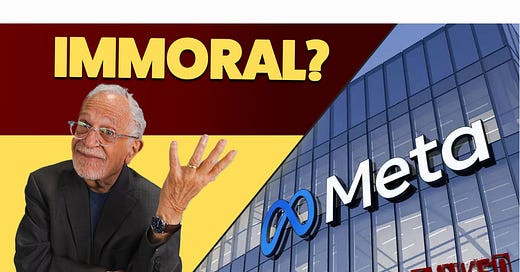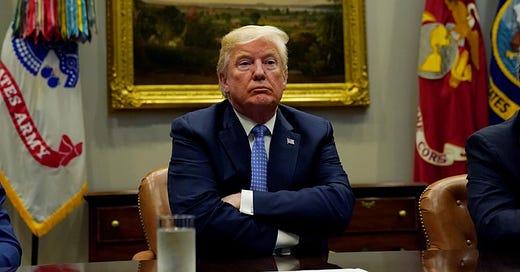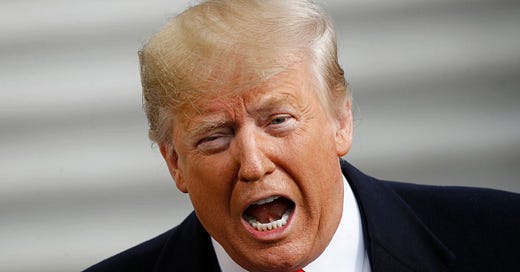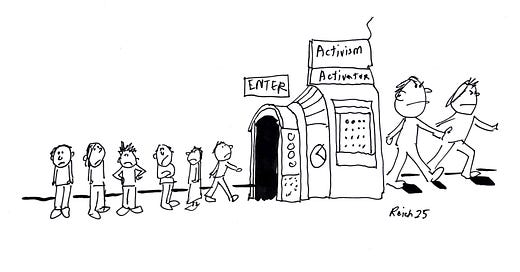
Debunking Myth #1: “Economics is an objective science that has nothing to do with politics or morality. Or power.”
Please click below for our overview video. You’ll find my fuller discussion just after.
Friends,
Welcome to our 10-part DEBUNK series!
Its goal is to equip you with what you need to know so you’re not misled by the most dangerous myths about our economic system.
Today we take on the first and most basic myth of all: that economics is an objective science that has nothing to do with politics or morality.
Rubbish. If you really want to understand the economy, you have to understand politics and morality, as well.
Economics, politics, and moral philosophy are now treated as separate disciplines — each with its own experts and specialists. But the three are inextricably intertwined.
That didn’t used to be the case.
Through most of the 1800s, the field of study we now call “economics” was called “political economy.” People who studied it saw the two fields as the same.
It wasn’t until 1890, when Alfred Marshall produced his monumental Principles of Economics, that the field of economics veered off on its own.
In the 1700s, the field was known as moral philosophy.
Adam Smith, the Scotsman who wrote The Wealth of Nations in 1776 and is considered the father of economics (especially by conservatives), never even called himself a political economist. He called himself a moral philosopher. Why? Because he was interested in the meaning of a good society.
That’s what it’s all about — or should be all about. What sort of society do we want? How do we understand a “good” society? What do we owe one another as members of such a society?
These questions lead to more specific questions, such as how much inequality is acceptable? How much poverty? Is slavery acceptable? Is it okay for young children to have to work? Should there be a minimum wage? Is it okay for an adult who works 40 hours a week or more to earn so little that her family is impoverished? Is it okay for children of the super-wealthy to inherit so much wealth that they never have to work a day in their lives?
These are all moral questions. Their answers can’t be found in mathematical formulae or in supply and demand curves. They have to do with public values, with the common good.
When we try to answer such moral questions, we also run directly into issues of power.
Who sets the rules? How much power should the wealthy have? Is it okay for corporations to monopolize a market? Is it okay for workers to join together to form labor unions, and should unionization be encouraged as a way to offset the power of big corporations?
America is no longer asking these sorts of basic questions. That’s partly because, as the 20th century unfolded, economists began to deemphasize politics and morals. They started treating economics as more of a science, less of a philosophical study that took into account morality and power.
As a result, public policy became more managerial and technocratic.
But economics, politics, and morality cannot be separated. If we want to achieve a good society — or at least a better society than we now have — we need to examine the moral underpinnings of economics and see how power is allocated.
And if power is being misallocated or abused, we need to change it.
But changing the allocation of power in society is extremely difficult. It typically takes a social movement in which large numbers of people come together to take on the status quo — and it’s often fought over many years. Think of civil rights, voting rights, women’s rights, abortion rights, marriage equality.
So, don’t let economists have the final word on what America (or any society) should be doing. In a democracy, that should be up to the people. And if you’re upset about what we’re doing, get involved.
***
Next week, we’ll examine a second myth: that government “intrudes” on the free market.
Thanks for joining me today.















Unions are the natural foil to large corporations. I’m thinking that for any corporation with more than 100 employees, a union should be mandatory.
Corporations cannot be trusted, for the most part, to properly care for their employees; look at how many don’t offer living wages, PTO, health insurance, educational benefits, etc. And look at the states that don’t require proper care of employees; state legislatures have been bought off by the very business leaders who are the most egregious “bad employers” and who wield the real power in this country.
Great to have your artwork back, Professor, because it always connects the dots with a thicker twine!
When I went to Cal in the ‘70s, I considered the major “Political Economy of Industrial Societies.” So I’ve been wise to the GOP lie of the lack of interdependence in these three dynamics for almost 50 years. What gets me is how that illusion of separation has been justified for things like the “trickle-down” theory where drips go to the middle class while buckets are offered in tax cuts and deregulation for CEOs and billionaires - those destined to be GOP donors to create the feedback look of #RepubloFascism.